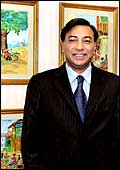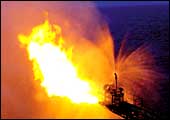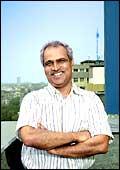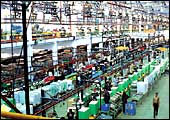|
For
a man who claims he can earn his livelihood by playing the flute-he
is a trained flautist-53-year-old Venugopal Dhoot, Chairman of
the Videocon Group, has quite an ambition, to head a global business
empire. He played this out to perfection last fortnight. First,
on June 28, Videocon sewed up the euro 240-million (Rs 1,248 crore)
acquisition of French media and electronics major Thomson sa's
Colour Picture Tube (CPT) and CPT glass business across China,
Poland and Mexico (the company had acquired Thomson's Italian
CPT plant a month ago, in a separate $100-million or Rs 440-crore
deal). Then, on July 7, it announced the much-anticipated takeover
of Swedish white goods major AB Electrolux's loss making Indian
operations, Electrolux Kelvinator Limited (EKL).
With the two deals (see The Tale Of Two Deals)
Dhoot has broken into the rarefied reaches of India Inc., hitherto
the preserve of Old Money like the Birlas, Tatas and Ambanis or
new-age upstarts such as K. Anji Reddy and N.R. Narayana Murthy.
That should give the son of a sugar-mill owner from Gangapur in
Maharashtra some satisfaction. Videocon and Dhoot have been around
in public consciousness since 1987 (that was the year Videocon
International, the consumer electronics firm was born), but neither
has received the kind of respect groups of that size and individuals
heading such companies do. The group's success in consumer electronics
and appliances has always been attributed to such things as price
or dealer-incentives and Dhoot, despite his track record at running
Videocon and sterling connections (Finance Minister P. Chidambaram,
Railways Minister Laloo Prasad Yadav and Civil Aviation Minister
Praful Patel were all present at the party he threw to celebrate
the Thomson deal) has always been seen as a bit of an outsider
in Mumbai's business circles.
| DHOOT'S GAMBLE |
»
Global scale will give him an edge in the low-cost,
low-tech, high-volume Colour Picture Tube (CPT) market
» Prospecting
oil and gas in countries Western firms won't touch will prove
profitable
» Sourcing
contracts from partners such as AB Electrolux will boost manufacturing
volumes, reducing cost |
| RISKY BUSINESS |
»
Competition in the global CPT market, especially
from integrated players such as LG-Philips, Samsung and Matsushita
is intense
» Rapid
adoption of LCD technologies can kill the CPT market sooner
than the 10-15 years Dhoot envisages
» Sourcing
contracts from AB Electrolux are not assured
» Prospecting
oil and gas in Sudan, Jordan and Yemen is rife with political
risks |
The Thomson and Electrolux deals should change
some of that. The Videocon Group has suddenly become a Rs 17,500-crore
entity with a global manufacturing footprint. And Dhoot, who has
spent nothing on the deals, (see Deal Mechanics) is increasingly
being seen as a finance whiz. "I like what he's achieved
with Thomson and Electrolux," says Lakshmi Mittal of Mittal
Steel, a close friend and advisor. " Videocon has today emerged
as a strong player, both in India and globally." Indeed,
Videocon's global CPT capacity of 19-million-units-a-year compares
favourably with LG-Philips Display's 38 million, Samsung's 32
million and Matsushita's 12 million. And in the Rs 20,000-crore
Indian consumer electronics and appliances market, Videocon has
held its own against the Koreans, thanks largely to a multi-brand
strategy that should now get a fillip with the acquisition of
licensing rights to Electrolux, Allwyn and Kelvinator brands.
With contracts worth $300 million (Rs 1,320
crore, and this is Electrolux's estimate; Dhoot claims it is much
higher at Rs 6,000 crore a year) for the supply of components,
even finished products, to AB Electrolux, Videocon looks all set
to thrive. And buoyed by a hugely successful domestic oil and
gas business that has become a cash cow for Videocon, Dhoot has
taken the global plunge, bagging and hunting for exploration and
production rights as far as Sudan, Jordan, Yemen, Ukraine and
Niger (see The Oil & Gas Story). Yet, there is much that can
go wrong with Dhoot's global gamble.
 There
are three things that Dhoot seems to be gambling on: that the
sourcing contracts from Electrolux will provide a steady revenue
stream and shore up the topline; that the benefits of scale will
help him compete in the commoditised CPT market and that CPTs
themselves will be around for the 10-15 years he expects them
to be; and that prospecting oil in global pariah-states such as
Sudan (where Western companies fear to tread) will pay-off. There
are three things that Dhoot seems to be gambling on: that the
sourcing contracts from Electrolux will provide a steady revenue
stream and shore up the topline; that the benefits of scale will
help him compete in the commoditised CPT market and that CPTs
themselves will be around for the 10-15 years he expects them
to be; and that prospecting oil in global pariah-states such as
Sudan (where Western companies fear to tread) will pay-off.
Simple Man, Simple Models
"On a recent visit of the Italian President
to Rashtrapati Bhavan, our President (Abdul Kalam) pointed to
me that I was perhaps standing on the wrong side of the table,
with the Italian business delegates," grins Dhoot. "The
fact was, for this meeting, I was introduced as an Italian, not
an Indian businessman." (Dhoot has considerable interests
in Italy). "When I recently met the Prime Minister, I briefed
him that during his upcoming trip to China he can avoid the same
mistake, for in Beijing, I will be introduced as a Chinese entrepreneur."
Dhoot has interests in China too.
| THE TALE OF TWO DEALS |
 |
| It's a deal: Dhoot (L) with Thomson
SA Chairman Frank Dangeard |
In November 2004, when Videocon
entered the race for the colour picture tubes manufacturing
capacity (19 million units a year across four plants in Europe,
Asia and North America) of Thomson SA, not too many people
gave the company a chance against the likes of LG-Philips
Display, Samsung and Matsushita. Yet, not just has CMD Venugopal
Dhoot pulled off the deal, he has done so on terms that are
favourable to his company. "The word is out in the world
that India and Indian companies are not just a good bet by
themselves, but also a hedge against China." Fine, but
surely, Thomson SA is likely to have looked at the right price,
not just a feel-good notion about the units it was selling
off being able to stand up to the might of Chinese competitors?
Fact is, Dhoot agreed to pay the asking price of euro 240
million (Rs 1,248 crore) without batting an eyelid (and net
of cash and debt, which continue to be Thomson's); the deal
was completed through a special purpose vehicle, Eagle Electronics.
Then, he managed to sell his oil and gas story to Thomson
as a great investment. Sure enough, after a due diligence
study by UBS, Thomson agreed to invest $295 million (Rs 1,298
crore) in Videocon Industries for a 15 per cent stake. The
Electrolux deal was struck pretty much the same way; in return
for taking over the company's 91.85 per cent stake in its
loss making Indian subsidiary (losses as of December 2005:
Rs 118 crore), Dhoot got the Swedish major to agree to invest
$94 million (Rs 413.6 crore) in Videocon Industries for around
5 per cent stake. And since Electrolux wanted to stick to
its business of consumer products (and not invest in anything
else), he agreed to merge Videocon International with Videocon
Industries. |
The anecdote itself may be apocryphal, but
there is adequate proof that Dhoot has fully bought into the global
business mindset. Ask him why, if the aim was to vertically integrate
Videocon's 17-million-units-a-year CPT glass business into a CPT
manufacturing facility, he did not look for an acquisition in
India (there are enough companies, such as Hotline, Samtel or
JCT) and pat comes the answer, "Since all companies are family-owned
in India, acquisitions are problematic. Globally it was easy,
as Thomson is run by professionals."
Then, and Dhoot understands this all too
well, the Thomson acquisition has positioned Videocon with global
heavyweights in the 151-million-units-a-year worldwide CPT market,
not in terms of just capacities, but also R&D capabilities,
one area where an Indian acquisition would not have helped. The
Thomson buyout brings almost 2,000 patents into Videocon's fold,
something it can leverage to fight the global display battle as
the market moves out of CPTs to Liquid Crystal Displays (LCD)
and Plasma. "Videocon can leverage the Thomson buyout to
be an aggressive price warrior in the CPT market globally, though
it remains to be seen how it actually plays the game," says
Ravinder Zutshi, Deputy Managing Director of the Rs 4,900-crore
Samsung Electronics India.
 |
"As Indian businesses
start to go global, Videocon has proved that it is right in
front"
Lakshmi Mittal
Chairman & CEO/Mittal Steel |
"He is a simple man who conducts business
based on simple models that he constructs in his mind," says
Vallabh Bhansali, Chairman, Enam Financial Consultants, an investment
banker and a good friend. Only, Dhoot has now expanded his horizon.
"As Indian businesses start to go global, Videocon has proved
that it is right in front," adds Mittal. Little wonder, then
Dhoot's rationale for the Thomson buyout is simple. "We are
the world's lowest cost producer of CPT glass and that's what
gave us the confidence to go in for Thomson." The deal provides
a ready market for Videocon's 17-million-units-a-year domestic
CPT glass capacity (under expansion to 24).
Most of Dhoot's recent moves can be explained
as simply: with the Electrolux deal, Videocon acquires licensing
rights to sell a global brand, Electrolux in India; it also bags
the Kelvinator and Allwyn brands in the bargain; and a $94-million
(Rs 413.6 crore) investment by the Swedish firm in the company
more than makes up for the Electrolux Kelvinator losses it takes
on. Then, there's the sourcing contract.
As for oil, Videocon has had some experience
in the business, and this is a great time to go shopping. "Well,
if we don't leverage this huge opportunity in countries where
Western companies can't or won't go in, we are not entrepreneurs
then, right?" says Dhoot's Man Friday and the financial wizard
behind Videocon's deals with Thomson and Electrolux, S.K. Shelgikar.
Dhoot makes it his job to travel and network
with the powers that be to enable his group access global oil
and gas markets. Five days before signing the deal for EKL, he
flew to Amman to meet the King of Jordan, whom he had written
to for an appointment (he was granted an audience). "My sense
is that the King wants us to be more than just an oil and gas
company in Jordan," says Dhoot. Though Videocon picked up
four on-shore oil and gas blocks in Jordan, Dhoot says he may
even look at putting down manufacturing facilities for consumer
electronics and appliances in Jordan, a move that will strengthen
his Africa and West Asia East play. After all, it would fit very
well with his $40-million (Rs 176-crore) manufacturing facility
in Oman and the new Rs 80-crore plant in South Africa.
| THE OIL & GAS STORY |
|
 The
beginning of Videocon's oil and gas foray can be traced
back to 1994. "At that time we had just done a $90-million
(Rs 288 crore at the then exchange rate) global depository
receipts (issue) and had surplus money," says Venugopal
Dhoot, Chairman, Videocon Group. Those were the pre-NELP
(National Exploration and Licensing Policy) days in the
hydrocarbon sector and Videocon got two blocks for $46 million
(Rs 147.2 crore then), Ravva in the Krishna Godavari basin
and another one, KS-OS6. Videocon, which has a 25 per cent
stake in Ravva (Cairn Energy has 22.5 per cent, ONGC, 40
per cent and Marubeni Oil, 12.5 per cent), hit pay dirt
three years ago with the field (it struck oil); today, the
company rakes in almost Rs 600 crore a year from the field.
KS-OS6, a 50: 50 joint venture between Cairn Energy and
Petrocon India (now amalgamated into flagship Videocon Industries),
however, proved a drain on resources, guzzling almost Rs
150 crore before the company decided to surrender it last
year. The
beginning of Videocon's oil and gas foray can be traced
back to 1994. "At that time we had just done a $90-million
(Rs 288 crore at the then exchange rate) global depository
receipts (issue) and had surplus money," says Venugopal
Dhoot, Chairman, Videocon Group. Those were the pre-NELP
(National Exploration and Licensing Policy) days in the
hydrocarbon sector and Videocon got two blocks for $46 million
(Rs 147.2 crore then), Ravva in the Krishna Godavari basin
and another one, KS-OS6. Videocon, which has a 25 per cent
stake in Ravva (Cairn Energy has 22.5 per cent, ONGC, 40
per cent and Marubeni Oil, 12.5 per cent), hit pay dirt
three years ago with the field (it struck oil); today, the
company rakes in almost Rs 600 crore a year from the field.
KS-OS6, a 50: 50 joint venture between Cairn Energy and
Petrocon India (now amalgamated into flagship Videocon Industries),
however, proved a drain on resources, guzzling almost Rs
150 crore before the company decided to surrender it last
year.
Between 1994 and 2001, the group was not very aggressive
in oil and gas and did not participate in the first four
rounds of NELP. "It was only in 2001, when global oil
prices crossed $20 (Rs 940 then) per barrel, that we started
relooking at the sector," says Dhoot. The company has
bid for three blocks under the ongoing NELP V; then, there
is the global foray into Sudan, Jordan, Yemen, Ukraine and
Niger. "Our overall philosophy is to get into areas
not attractive for US companies because of (political and
economic) sanctions," says S. Padmanabhan, Head of
the group's oil and gas business. For these countries, an
Indian company presents an option (lest they have to surrender
it all to a Chinese firm). And for firms like Videocon,
it is too good an entrepreneurial opportunity to ignore.
The company has already got one offshore block in Sudan
and four onshore ones in Jordan.
Videocon lacks exploration and production capabilities
and doesn't possess even basic 'operator capabilities' that
prospecting companies do. "We know the business now
and are looking to build operator capability as well as
buy into some current oil bearing assets," says Padmanabhan.
There are reports that it is looking at picking up a substantial
stake, for over $200 million (Rs 880 crore), in its NELP
partner Oilex, an Australian firm. It is also reported to
be looking at buying a few oil producing fields in Yemen.
"Who'll bail them out in case of political trouble
in these countries?" questions one oil and gas analyst,
pointing to the obvious risk. Then, that's a risk Dhoot
is willing to take.
|
The Global Gamble
"There is money to be made even in ship
wrecking. Videocon may asset strip Thomson," says an industry
watcher in India. While that accusation may be a bit far-fetched,
Dhoot has enough things to worry about. Analysts punch holes in
Videocon's Thomson buyout, pointing out that CPT technology is
on the decline, especially in European and American markets where
Thomson has its facilities. "Globally, almost 89 per cent
of the display market is still CPTs, and the market is here for
at least 15 years," defends Dhoot. He also points to that
fact that Thomson factories already run a Plasma line and will
start making LCD displays within the next two years, helping him
stay ahead of the technology curve. Then, there are the slim CPT
displays that most CPT majors, much like Videocon-Thomson, are
banking on; Samsung launched televisions based on this in India
in the first week of July.
| VIDEOCON'S FAILED DIVERSIFICATIONS |
| I
don't even want it back," says Venugopal Dhoot, chairman
of Videocon Group. He is referring to the Rs 150 crore owed
to Videocon Power by the Tamil Nadu Electricity Board for
the proposed 1,050 MW coal-based plant in North Chennai, which
never got built with the issue going into arbitration. Obviously
Videocon's disastrous foray into the power sector and leasing
with Videocon Leasing & Industrial Finance Limited (rechristened
Videocon Industries) in the early- and mid-1990s is something
Dhoot would like to forget, especially now, in his hour of
glory. Still, it is hard to forget that four years ago Videocon
was a candidate to take over the troubled Dabhol Power Corporation.
Then, there is the much celebrated Rs 5,000-crore Mumbai integrated
Special Economic Zone (SEZ) project, where Videocon dropped
out last year after being part of the consortium (comprising
Sea King Infrastructure, Hiranandani Constructions and Avinash
Bhosale Infrastructure) that won the bid. "There can
be either business partnership or friendship," says Dhoot,
on his reasons for quitting the yet-to-start-project, leaving
it for "good friend" Nikhil Gandhi of Sea King Infrastructure.
Finally, three years ago, Videocon announced a major foray
into media and entertainment through Videocon Entertainment,
with plans for several news channels. The project never saw
the light of the day. "Frankly, media isn't our cup of
tea," says Dhoot. He'd rather be written about. |
But what about losses at Thomson? Surely Dhoot
doesn't expect it to turn around by merely sending cheap glass
from India? And even in the domestic market, Videocon's monopoly
in CPT glass is under threat with Hotline all set to roll out
its integrated 12-million CPT glass line at Gwalior by May 2006.
"We're not afraid of Videocon," says Anil Gupta, Chairman,
Hotline Group. "By July next year, with an integrated CPT-CPT
glass line in place, no one will be able to compete with us on
price." Dhoot claims that Thomson CPT's losses stem from
the high capital cost of its Mexican plant (the capital cost component,
obviously, does not affect him). "As the television market
in India moves to bigger screen sizes and slims, which no one
makes here, we can start importing these from our global factories,"
he adds, already looking to the future.
 |
 |
"Videocon can leverage
the Thomson buyout to be a price warrior in the global CPT
market, though it remains to be seen"
Ravinder Zutshi
Deputy MD/Samsung Electronics India |
"If we don't leverage this
huge opportunity in countries where Western companies can't
or won't go in, we are not entrepreneurs, right?"
S.K. Shelgikar
Advisor/Videocon Group |
Videocon's biggest challenge, however, could
come from closer home, its lack of bench-strength in management.
The family is actively involved with the business, with Dhoot's
younger brothers Rajkumar Dhoot, a member of Indian Parliament's
upper house and Pradeep Dhoot, and son Anirudh Dhoot taking care
of several parts of the empire. "He is the entrepreneur,
the go-getter and the strategist," says a close business
associate. "But to run a global business empire he has to
bring in professionals who can become credible faces of his diversified
global business."
Today, all Dhoot can point to in terms of
professionals is Shelgikar, the head of corporate affairs Kuldip
Drabu, and the head of the group's oil and gas business, S. Padmanabhan.
As he turns his attention to managing 19 factories across four
continents, in culturally diverse environments, the lack of management
bandwidth could prove a serious handicap.
Dhoot's gambit is an opportunistic, risky
play. Then, the man has always been a gambler of sorts (see Videocon's
Failed Diversifications). "Revenues from oil and gas have
substantially funded Videocon's electronics and durable business
for some time now," says Nikhil Vora, Vice President (Research)
at Mumbai-based brokerage SSKI. His reference is to the fact that
had Dhoot not gambled on oil and gas and CPT glass shells way
back in 1994, Videocon would have probably gone the way of other
Indian consumer electronics firms.
 |
| Videocon's washing machine plant in Aurangabad:
The company has not recived the respect a firm its size
normally does |
For all the risks associated with Videocon's
global oil foray, the fact remains that its international exposure
is still limited to just $150 million (Rs 660 crore) currently
($100 million or Rs 440 crore in Sudan and $50 million or Rs 220
crore in Jordan) much less than the $300 million (Rs 1,320 crore)
of yearly sourcing contracts that the company hopes to bag from
AB Electrolux.
With 10 brands in its portfolio, and 19 factories
globally, Videocon is proof of Dhoot's ability to think big. "Dhoot
has proved that with strategy and fire in the belly, you can achieve
much," says Mittal. With a global empire to manage, the next
two years will be a critical period for Dhoot and Videocon. The
man has established himself as a global entrepreneur in his own
right. Now, he has to prove himself just as global a manager.
|





 There
are three things that Dhoot seems to be gambling on: that the
sourcing contracts from Electrolux will provide a steady revenue
stream and shore up the topline; that the benefits of scale will
help him compete in the commoditised CPT market and that CPTs
themselves will be around for the 10-15 years he expects them
to be; and that prospecting oil in global pariah-states such as
Sudan (where Western companies fear to tread) will pay-off.
There
are three things that Dhoot seems to be gambling on: that the
sourcing contracts from Electrolux will provide a steady revenue
stream and shore up the topline; that the benefits of scale will
help him compete in the commoditised CPT market and that CPTs
themselves will be around for the 10-15 years he expects them
to be; and that prospecting oil in global pariah-states such as
Sudan (where Western companies fear to tread) will pay-off. 

 The
beginning of Videocon's oil and gas foray can be traced
back to 1994. "At that time we had just done a $90-million
(Rs 288 crore at the then exchange rate) global depository
receipts (issue) and had surplus money," says Venugopal
Dhoot, Chairman, Videocon Group. Those were the pre-NELP
(National Exploration and Licensing Policy) days in the
hydrocarbon sector and Videocon got two blocks for $46 million
(Rs 147.2 crore then), Ravva in the Krishna Godavari basin
and another one, KS-OS6. Videocon, which has a 25 per cent
stake in Ravva (Cairn Energy has 22.5 per cent, ONGC, 40
per cent and Marubeni Oil, 12.5 per cent), hit pay dirt
three years ago with the field (it struck oil); today, the
company rakes in almost Rs 600 crore a year from the field.
KS-OS6, a 50: 50 joint venture between Cairn Energy and
Petrocon India (now amalgamated into flagship Videocon Industries),
however, proved a drain on resources, guzzling almost Rs
150 crore before the company decided to surrender it last
year.
The
beginning of Videocon's oil and gas foray can be traced
back to 1994. "At that time we had just done a $90-million
(Rs 288 crore at the then exchange rate) global depository
receipts (issue) and had surplus money," says Venugopal
Dhoot, Chairman, Videocon Group. Those were the pre-NELP
(National Exploration and Licensing Policy) days in the
hydrocarbon sector and Videocon got two blocks for $46 million
(Rs 147.2 crore then), Ravva in the Krishna Godavari basin
and another one, KS-OS6. Videocon, which has a 25 per cent
stake in Ravva (Cairn Energy has 22.5 per cent, ONGC, 40
per cent and Marubeni Oil, 12.5 per cent), hit pay dirt
three years ago with the field (it struck oil); today, the
company rakes in almost Rs 600 crore a year from the field.
KS-OS6, a 50: 50 joint venture between Cairn Energy and
Petrocon India (now amalgamated into flagship Videocon Industries),
however, proved a drain on resources, guzzling almost Rs
150 crore before the company decided to surrender it last
year.

